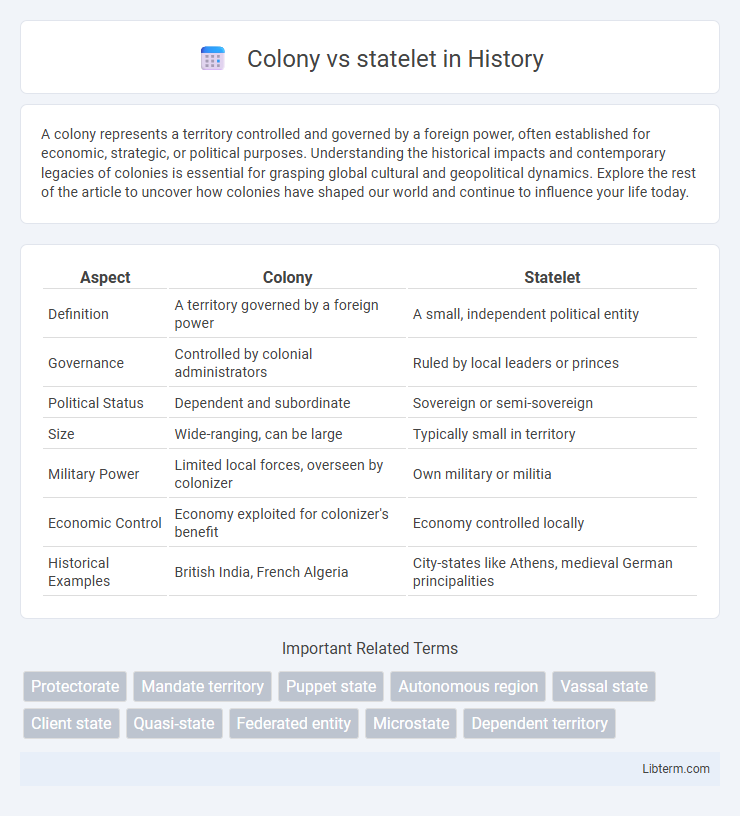A colony represents a territory controlled and governed by a foreign power, often established for economic, strategic, or political purposes. Understanding the historical impacts and contemporary legacies of colonies is essential for grasping global cultural and geopolitical dynamics. Explore the rest of the article to uncover how colonies have shaped our world and continue to influence your life today.
Table of Comparison
| Aspect | Colony | Statelet |
|---|---|---|
| Definition | A territory governed by a foreign power | A small, independent political entity |
| Governance | Controlled by colonial administrators | Ruled by local leaders or princes |
| Political Status | Dependent and subordinate | Sovereign or semi-sovereign |
| Size | Wide-ranging, can be large | Typically small in territory |
| Military Power | Limited local forces, overseen by colonizer | Own military or militia |
| Economic Control | Economy exploited for colonizer's benefit | Economy controlled locally |
| Historical Examples | British India, French Algeria | City-states like Athens, medieval German principalities |
Defining Colonies and Statelets
Colonies are territories governed and controlled by a foreign power, often established for economic exploitation or strategic advantage, lacking full sovereignty. Statelets are small, semi-autonomous political entities with limited self-governance, typically emerging from fragmented regions or in transitional sovereignty phases. Both differ fundamentally in their levels of political independence, administrative structures, and external influence.
Historical Origins of Colonies and Statelets
Colonies originated during periods of exploration and expansion, established by powerful states to exploit new territories and resources, often governed directly by the colonizing nation. Statelets emerged historically as small, autonomous political units with limited territorial control, typically arising from tribal, ethnic, or decentralized social structures lacking centralized authority. The distinct historical origins reveal colonies as extensions of empire-building, whereas statelets reflect localized sovereignty and fragmented governance in early political development.
Legal Status and International Recognition
Colonies are territories under the sovereignty of a foreign state, lacking independent legal status and international recognition as separate entities. Statelets possess limited sovereignty with partial self-governance but often remain unrecognized or only partially recognized by international bodies. Their legal status hinges on diplomatic recognition, affecting their ability to enter treaties and participate in global institutions.
Governance Structures: Comparing Authority and Autonomy
Colonies operate under centralized governance imposed by an external sovereign power, limiting local autonomy through appointed governors and colonial administrations that enforce imperial policies. Statelets exhibit decentralized governance with greater self-rule, often maintaining indigenous leadership and localized decision-making structures that preserve cultural and political autonomy. The distinction hinges on the degree of authority exercised externally versus internally, impacting the scope of legislative, executive, and judicial powers within each entity.
Economic Implications of Colony vs Statelet Status
Colonies often experience economic dependence on a colonial power, characterized by resource extraction and limited industrial development, which constrains local economic autonomy. Statelets, by contrast, typically maintain greater control over their economic policies, facilitating diversified economies and local entrepreneurship, though they might face challenges due to limited scale. The economic implications of colony versus statelet status significantly affect trade patterns, investment flows, and long-term developmental prospects.
Cultural Identity and Societal Impact
Colonies often experience cultural assimilation or suppression due to dominant external control, leading to hybrid identities shaped by colonial powers, whereas statelets maintain stronger preservation of indigenous customs and traditions through localized governance. The societal impact in colonies includes disrupted social structures and imposed foreign cultural norms, while statelets foster cohesive community identity and cultural continuity. These dynamics influence language preservation, religious practices, and social hierarchies, significantly affecting collective memory and heritage.
Colonialism, Self-Determination, and Statelet Movements
Colonialism imposes external control over territories, limiting local self-determination and often sparking resistance movements striving for independence. Statelet movements emerge as expressions of marginalized groups seeking recognition and autonomy within or beyond colonial frameworks. The tension between colonial powers and statelets highlights ongoing struggles for political legitimacy and self-governance in post-colonial contexts.
Case Studies: Notable Colonies and Emerging Statelets
The British Colony of Hong Kong exemplifies a historically significant colony with extensive economic integration and direct governance by the British Crown. In contrast, the Kurdistan Region in Iraq represents an emerging statelet characterized by autonomous governance within a federal state, seeking international recognition. These case studies highlight the distinct political structures and degrees of sovereignty that differentiate established colonies from evolving statelets.
Challenges Faced by Colonies and Statelets Today
Colonies and statelets face significant challenges in maintaining political autonomy and economic stability amid pressure from dominant nation-states and global powers. Limited international recognition restricts access to critical resources, trade opportunities, and diplomatic support, exacerbating vulnerabilities in governance and development. These entities also struggle with internal socio-political conflicts and infrastructure deficits, hindering sustainable growth and effective administration.
Future Prospects: Transition, Integration, or Independence?
Colonies often face complex future prospects involving transition towards self-governance, integration into a larger state, or full independence, depending on political, economic, and social factors. Statelets, being smaller and often less economically viable entities, may pursue integration with neighboring states for stability or limited autonomy within a federal framework. The trajectory of both colonies and statelets is influenced by international law, local nationalist movements, and economic sustainability considerations.
Colony Infographic

 libterm.com
libterm.com